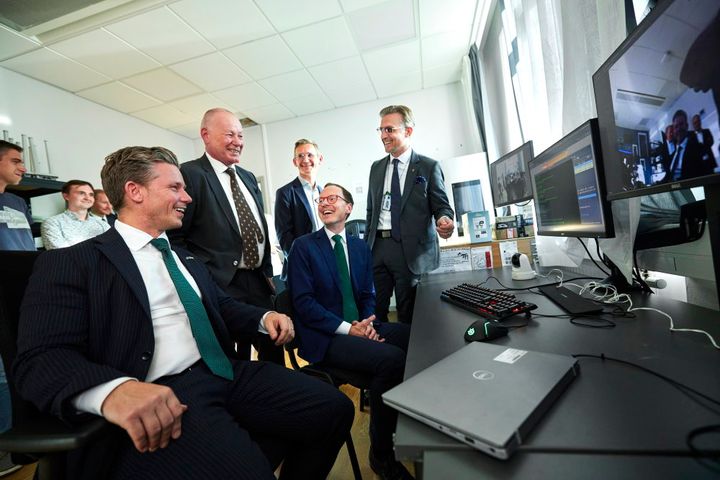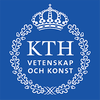KTH has key role in Sweden’s proposed Cybercampus for defense research and education
STOCKHOLM (September 7, 2023) KTH Royal Institute of Technology is to play a central role in developing Sweden's cyber defense education and research, under the government budget proposal announced yesterday for a new Cybercampus Sweden.

Swedish Defense Minister Pål Jonson and Education Minister Mats Persson appeared at KTH yesterday to unveil the government’s proposal to invest 100 million Swedish crowns to launch Cybercampus Sweden. The outlay includes funding through 2026.
The announcement was made at KTH’s Centre for Cyber Defence and Information Security, which was founded in 2020 as a collaboration between KTH and Sweden’s Armed Forces. Since 2020, the Swedish Defence Research Agency (FOI), the National Defence Radio Establishment (FRA), the Swedish Defence University and the Swedish Civil Contingencies Agency (MSB) have also joined CDIS.
CDIS will now become part of Cybercampus Sweden, which will aim at strengthening research, education and innovation in the nation’s cyber defense, through collaboration between the country’s universities, public agencies, businesses and research institutes.
"This is a necessary investment considering the current security situation and the state of the world today. KTH is the hub for this initiative, and there is unique expertise here," Persson says.
"It's a huge, important, and certainly exciting initiative,” says Anders Söderholm, president of KTH. “The investment is very timely, and together, in a broad partnership and collaboration, we aim to make society more robust and secure. Both our educational and research environments will play a crucial role in this effort.”
The idea of a cyber campus has been in development for a couple of years, originally initiated by KTH, the research institute RISE, and the Swedish Armed Forces. Through a Vinnova initiative, an interim center has been established with even more stakeholders, including MSB, Karlstad University, Ericsson, and Saab.
"We've been working on this for two years, and now we can enter an operational phase," says David Olgart, who will serve as director of Cybercampus Sweden.
Pontus Johnson, a professor of network and systems engineering and director of CDIS at KTH, emphasized that the world is filled with vulnerabilities in our various systems. He stressed the importance of research, innovation, and long-term solutions to better secure and defend systems against attacks.
"This investment is absolutely critical for Swedish cybersecurity and for us to secure the supply of competence, to conduct research and to innovate in the long run," he said.
During the ministers’ visit, Jonson and Persson were given a demonstration of how quickly and easily it can be to hack into someone's computer by some of KTH's students.
Images

Subscribe to releases from KTH Royal Institute of Technology
Subscribe to all the latest releases from KTH Royal Institute of Technology by registering your e-mail address below. You can unsubscribe at any time.
Latest releases from KTH Royal Institute of Technology
Study explains why new kinds of steel needed to build lead cooled reactors11.12.2025 14:23:59 CET | Press Release
Safer operation, better fuel efficiency and lower waste mark lead-cooled nuclear power as a potentially dramatic shift from the water-cooled nuclear stations the world has relied on since the mid 20th century. A recent Swedish study casts new light on how to avoid corrosion in the steel used to build these next-generation nuclear facilities.
Alternative to BPA passes toxicity and sustainability standards set by EU innovation guidelines4.12.2025 11:07:37 CET | Press Release
Polyester and a host of other plastic products could potentially be manufactured with non-toxic and sustainable BPA alternatives identified in a multidisciplinary study published today by researchers in Sweden.
Study shows potential for more affordable and efficient hydrogen gas production3.12.2025 15:29:35 CET | Press Release
A recent advance in the science of hydrogen fuel production could enable higher output and more sustainable production of this renewable energy source, researchers with Stockholm’s KTH Royal Institute of Technology report.
Calcium-sensitive switch designed to boost efficacy of cancer drugs24.11.2025 21:11:53 CET | Press Release
Cancer-fighting antibody drugs are designed to penetrate tumor cells and release a lethal payload deep within, but too often they don’t make it that far. A new study shows how this Trojan Horse strategy works better by exploiting calcium differences outside and inside cells.
Potential treatment may prevent brain damage in premature babies11.11.2025 11:10:46 CET | Press Release
A treatment that could protect premature babies from brain damage showed promise in a recent study in Sweden. Using a first-of-its-kind prenatal brain model created with human cells, researchers observed new details about the effects of cerebral hemorrhages on stem cells during premature birth. And they successfully tested an antidote that reduced the damage.
In our pressroom you can read all our latest releases, find our press contacts, images, documents and other relevant information about us.
Visit our pressroom